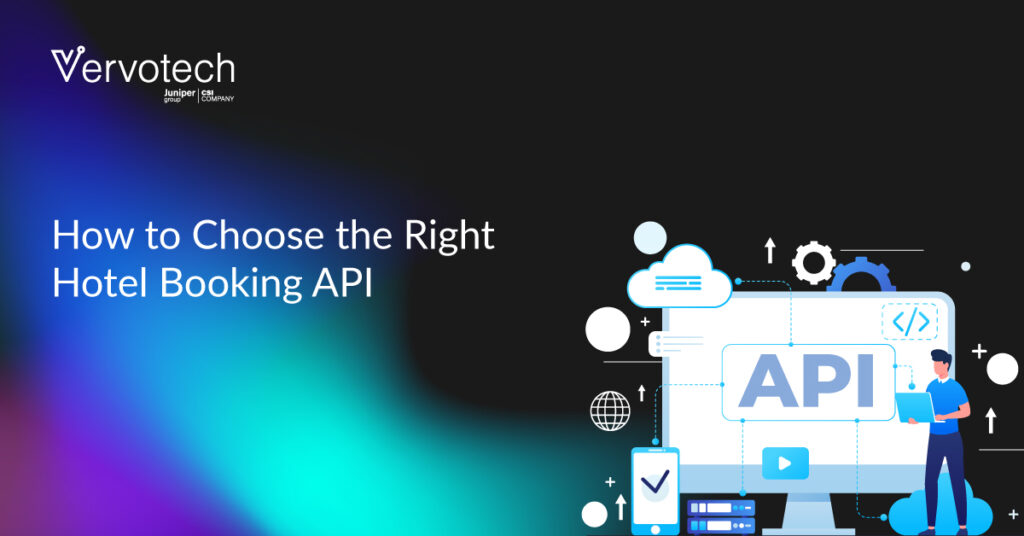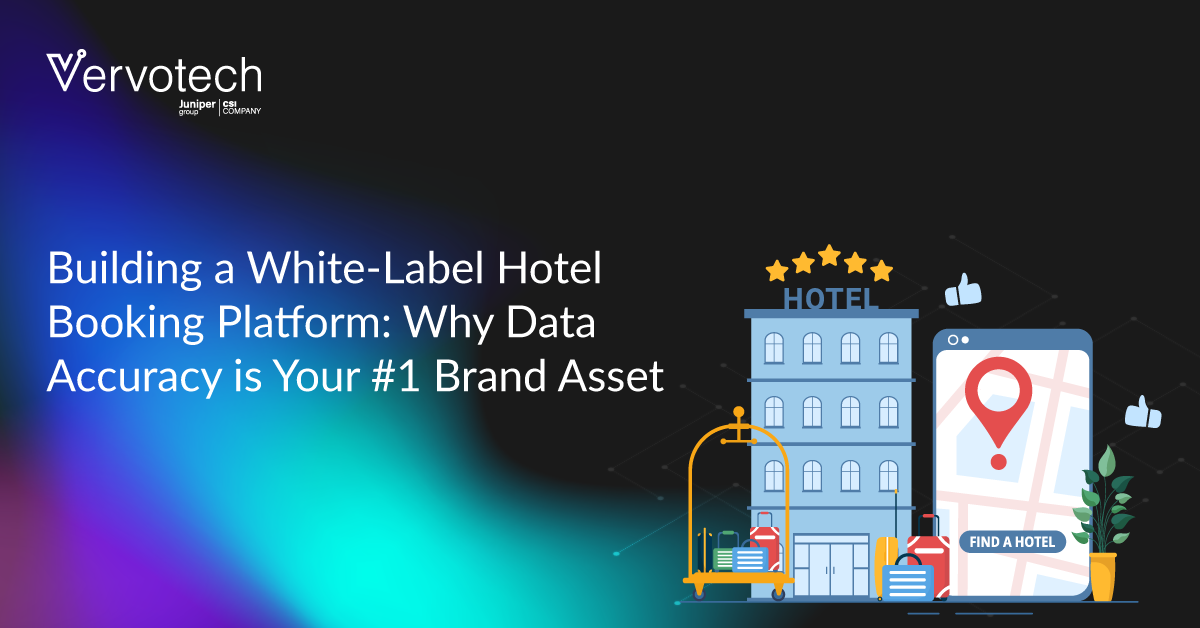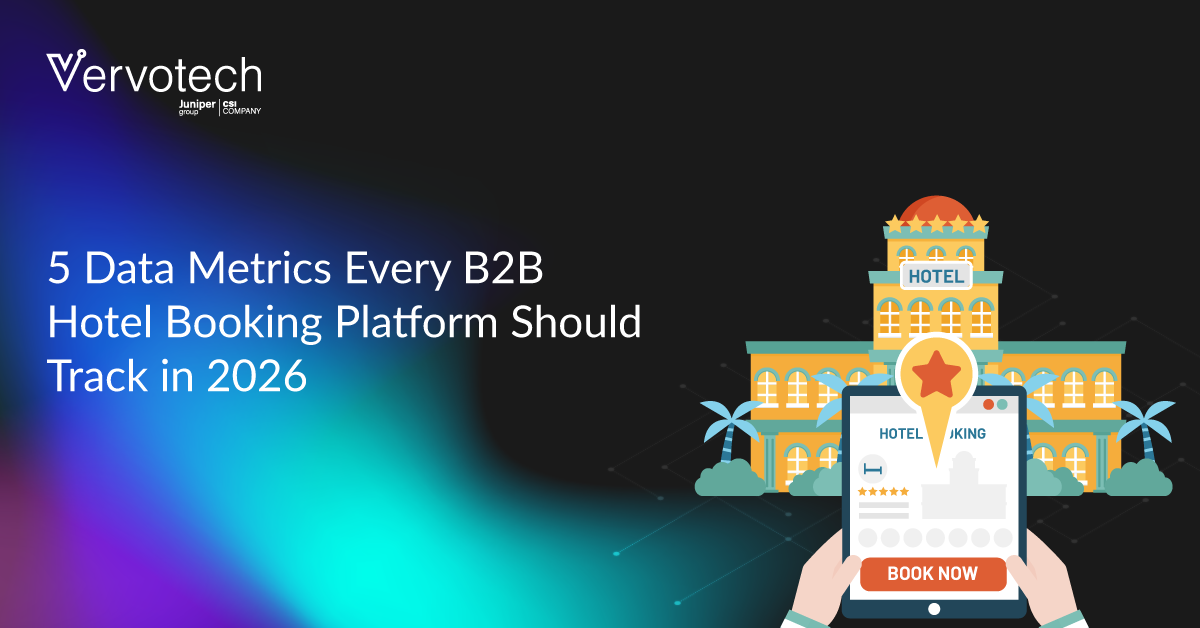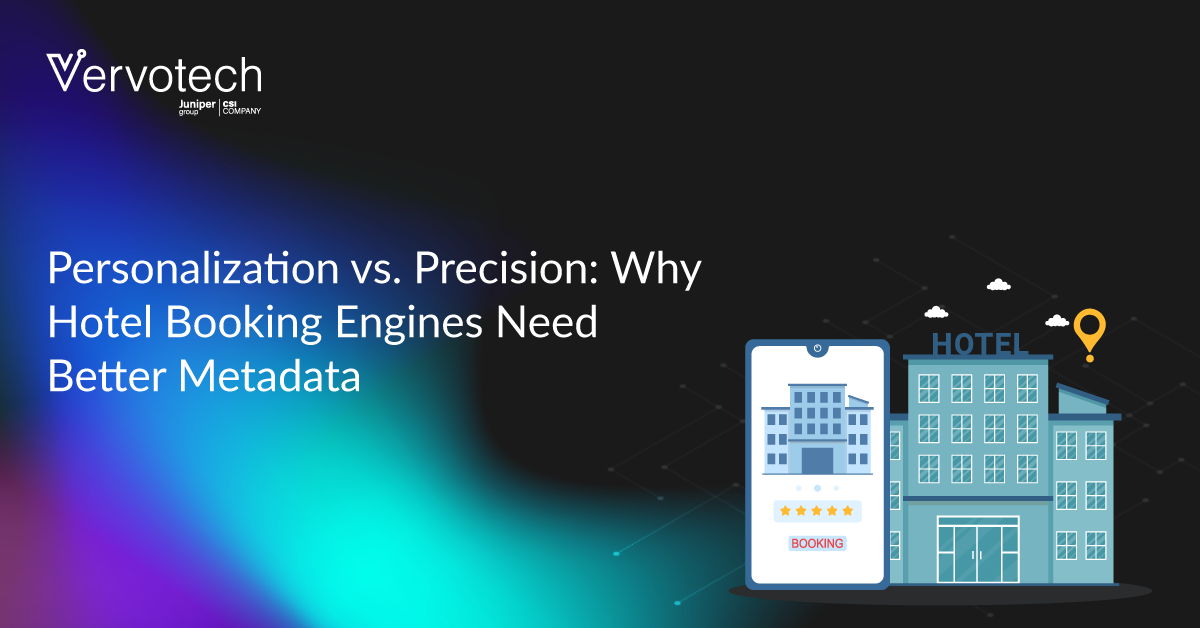If you run an OTA or you’re in the process of building one, you’re probably aware of the Hotel Booking API- the backbone that connects your platform to a large network of hotels, empowering you to deliver a seamless booking experience.
Mais de 83% dos viajantes preferem utilizar plataformas online para reservar alojamentos, o que obriga as plataformas de reserva de viagens a oferecer opções de reserva de hotéis simples, fiáveis e em tempo real para se manterem competitivas.
This is why you need to ensure that you choose the right Hotel Booking API for your hotel booking platform.
However, not all APIs are created equal. From inventory diversity to integration flexibility, choosing the right API can make or break your business. The availability of choice in the market can understandably put you in a tough spot in the quest to find the right Hotel Booking API that fulfills all your needs at the right cost.
On the other hand, a bad choice of Hotel Booking API can hold you back from expanding your booking platform’s potential. We’ve put together this comprehensive step-by-step guide to help you select a Hotel Booking API that is the right choice for your business.
Let’s begin by understanding the factors that play a major role in selecting the right Hotel Booking API.
TL; DR
- A Hotel Booking API connects your platform to a network of hotels, enabling real-time search and bookings.
- With over 83% of travelers preferring online platforms, offering a seamless booking experience is critical.
- Choosing the wrong API can limit your platform’s growth, while the right one can boost customer satisfaction and revenue.
- Key factors to consider include inventory coverage, integration flexibility, real-time updates, pricing model, performance, customization, support, security, and scalability.
- Evaluating these factors ensures your OTA is future-ready, efficient, and competitive.
Factores-chave a considerar na escolha de uma API de reservas de hotéis
A seleção da API de reservas de hotéis correta é fundamental para garantir que a sua OTA funciona de forma eficiente, oferece uma experiência de utilizador excecional e se mantém competitiva. Aqui estão os principais factores a avaliar ao tomar a sua decisão:
1. Inventário e cobertura
Certifique-se de que a API dá acesso a um inventário abrangente de hotéis, incluindo opções económicas, propriedades de luxo, hotéis boutique e alojamentos únicos, como moradias ou alugueres para férias. Esta variedade permite satisfazer as diversas preferências dos clientes e alargar o seu interesse. Dependendo do seu mercado-alvo, verifique se a API fornece listagens de hotéis internacionais ou se é especializada em regiões específicas. Para as OTAs que pretendem expandir-se a nível mundial, é indispensável um inventário mais vasto.
2. Flexibilidade de integração
Verifique se a API se integra facilmente com os seus sistemas existentes, como motores de reserva, ferramentas de CRM ou gateways de pagamento. As APIs com processos de integração simples reduzem o tempo e os custos de desenvolvimento. Confirme que a API é compatível com as linguagens de programação e as estruturas utilizadas pela sua equipa de desenvolvimento. Uma API compatível com ferramentas modernas garante uma implementação mais fácil.
3. actualizações de dados em tempo real
Informações desactualizadas sobre a disponibilidade de quartos ou preços podem levar a erros de reserva, insatisfação do cliente e potencial perda de receitas. Escolha uma API que forneça actualizações frequentes e precisas para evitar estas armadilhas. Durante as épocas altas de viagens ou eventos promocionais, as actualizações em tempo real tornam-se ainda mais críticas para garantir que os clientes vêem as opções mais actualizadas.
4. Modelo de custos e preços
Assess the API provider’s fee structure, which could include setup costs, subscription fees, pay-per-use models, or commission-based charges. Opt for a model that aligns with your revenue strategy. Consider how the API will contribute to your bottom line. While some APIs might have higher costs, their features and performance could justify the investment by driving higher booking volumes.
Also read: 10 Best Practices for Nailing Customer Experience with a Hotel Booking API
5. Desempenho da API
Um tempo de atividade elevado garante que a sua OTA pode processar reservas sem interrupções, mesmo durante períodos de elevado tráfego. Uma API fiável minimiza o risco de perder clientes para a concorrência. Avalie o tempo de resposta da API, uma vez que os atrasos no carregamento das opções de hotel ou na confirmação das reservas podem frustrar os utilizadores e levar ao abandono do carrinho.
6. Personalização e caraterísticas
Os filtros avançados, como os de comodidades (por exemplo, Wi-Fi, piscinas), localização e classificações de clientes, podem melhorar a experiência do utilizador, permitindo que os clientes encontrem exatamente o que procuram. Procure APIs que suportem preços dinâmicos, permitindo-lhe apresentar tarifas competitivas em tempo real. Funcionalidades como promoções e opções de upselling (por exemplo, check-out tardio ou ofertas de pequeno-almoço) podem aumentar a receita por reserva.
7. Apoio ao cliente e documentação
Certifique-se de que o fornecedor oferece apoio atempado durante o processo de integração e para quaisquer problemas em curso. O suporte confiável pode evitar o tempo de inatividade e garantir uma experiência tranquila para o cliente. A documentação de API de alta qualidade e bem organizada facilita aos seus programadores a compreensão, integração e resolução de problemas do sistema de forma eficiente.
8. Segurança e conformidade
A API deve utilizar encriptação robusta e protocolos seguros (por exemplo, HTTPS) para proteger as informações do cliente durante as transacções. Verifique se o fornecedor cumpre as leis de privacidade de dados (por exemplo, GDPR para a Europa, PCI DSS para segurança de pagamentos). O incumprimento pode resultar em coimas pesadas e danos na sua reputação.
9. Escalabilidade e preparação para o futuro
Choose an API that can handle increased traffic and expanded hotel inventory as your business grows. Scalability ensures your OTA can meet future demand without major overhauls. APIs that regularly update their features and technology help you stay competitive in a rapidly evolving industry. Look for providers that are proactive in adopting new trends, such as AI-powered recommendations or voice search compatibility.
Agora que já analisou todos os factores que influenciam a escolha da sua API de reservas de hotéis, vamos analisar os 5 mais populares.
Are you looking to explore the latest Hotel Content Trends, Challenges & Solutions?
Get access to our smart guide to hotel content and learn how Vervotech’s AI solutions can help your business drive success.
Descarregar o livro eletrónico gratuito
5 APIs de reserva de hotéis mais populares
The table below compares different aspects of the five most popular Hotel Booking APIs that you can choose from:
| Feature | Expedia Rapid API | Hotelbeds API | Amadeus Hotel API | Booking.com API | Travelpayouts Hotel API |
| Visão geral | Access to a large global hotel network with powerful search and booking capabilities. | Offers an extensive selection of hotels worldwide, focused on wholesale distribution. | Global hotel booking API with integration into other travel services (flights, cars). | Provides comprehensive hotel inventory, real-time pricing, and booking capabilities. | Provides a wide range of hotels with access to real-time availability and commissions. |
| Inventário | Extensive global coverage with major chains and independent hotels. | Wide-ranging inventory of hotels, especially for bulk bookings. | Broad inventory, including both major hotel chains and smaller independent properties. | Access to millions of properties worldwide, focusing on independent hotels and boutique accommodations. | Access to a broad range of hotels globally, including large chains and smaller properties. |
| Integração | Simple API integration with detailed documentation. | Requires integration with Hotelbeds’ platform, ideal for wholesale bookings. | Easy integration with comprehensive documentation, especially for full-service travel platforms. | Straightforward integration with well-documented API guides and strong developer support. | Offers easy integration with a clean interface and real-time data. |
| Personalização | Basic search filters with dynamic pricing and some customization options. | Limited customization but offers search and pricing features. | Highly customizable with filters like amenities, location, star rating, etc. | Provides some customization through search filters, room types, and pricing options. | Offers customizable search filters for accommodation types, amenities, and other preferences. |
| Estrutura de custos | Commission-based, varies depending on agreement. | Commission-based, fees depend on booking volume and agreements. | Pay-per-use or commission-based, pricing is flexible. | Commission-based, varies depending on the number of bookings made. | Commission-based, pay-per-booking or per-click options available. |
| Apoio | Dedicated support for larger OTAs, with a strong knowledge base. | 24/7 support with dedicated account managers for larger clients. | Extensive technical support and integration specialists available. | Comprehensive support system with detailed API guides and live chat assistance. | Offers detailed documentation and 24/7 customer support for integrations and technical issues. |
| Segurança | Meets GDPR, PCI DSS standards, and other relevant security measures. | Compliant with GDPR, PCI DSS, and secure payment protocols. | Adheres to PCI DSS and other industry security standards for transactions. | Strong security with compliance to GDPR, PCI DSS, and secure data protocols. | Implements SSL encryption and complies with PCI DSS for secure transactions. |
| Caraterísticas únicas | Offers integration with flights, car rentals, and other travel services, enabling OTAs to provide a full-service travel solution. | Specializes in wholesale hotel bookings, catering primarily to B2B OTAs. | Integration across various travel services and deep customization options for large-scale OTAs. | Millions of properties with real-time availability and a focus on independent accommodations. | Offers flexible pricing models, including pay-per-click and per-booking commissions. |
So, that was the list! But how would you decide which API is right for your business? Do not worry, follow the steps mentioned in the next section to make the right decision.
Also Read: Key Features of a Top API Provider
Passos para avaliar uma API de reservas de hotéis
When evaluating a hotel booking API for your Online Travel Agency (OTA), it’s crucial to take a structured approach. Here’s a step-by-step breakdown to guide you through the process:
Passo 1. Definir as necessidades e os objectivos da sua empresa
Before you start evaluating APIs, it’s important to have a clear understanding of your business objectives. This will help you focus on the features that matter most for your OTA.
- Identify target market: Are you catering to luxury travelers, budget-conscious customers, or niche markets (e.g., vacation rentals)?
- Scalability: How do you envision your OTA growing? Will the API scale with your business as you expand?
- Integration requirements: What existing systems or platforms (CRM, payment systems, etc.) need to integrate with the API?
Step 2. Assess Inventory and Coverage
A robust hotel booking API should provide access to a wide variety of properties to meet diverse customer preferences.
- Global vs. Regional Reach: Does the API offer international listings or specialize in certain regions?
- Variety of properties: Ensure the API supports a broad range of hotels, from budget accommodations to luxury and unique properties like villas or boutique hotels.
- Real-time availability: Does the API provide live updates to prevent overbookings or pricing discrepancies?
Step 3. Evaluate Integration Flexibility
Smooth integration with your existing tech stack is crucial to ensure minimal disruption to your operations.
- Ease of integration: Does the API provide clear documentation for quick integration? Are SDKs, libraries, or plugins available to simplify the process?
- Compatibility: Ensure that the API supports the programming languages and frameworks your developers are using.
- Support for multiple platforms: Does the API offer integration across different devices (web, mobile, etc.)?
Step 4. Review Customization and Search Features
A hotel booking API should allow customization to tailor the user experience and offer features that boost booking conversions.
- Advanced search filters: Can customers filter results by amenities, location, star ratings, or room types?
- Dynamic pricing: Does the API support dynamic pricing based on demand, season, or promotions?
- Personalization: Does the API enable personalized recommendations based on customer behavior or preferences?
Step 5. Check for Cost and Pricing Models
Understand the financial implications of using the hotel booking API and how it aligns with your revenue model.
- Pricing structure: Is the pricing based on commissions, per booking, or a flat subscription fee?
- Transparency: Is the pricing structure clear, and are there any hidden fees (e.g., setup costs or transaction fees)?
- ROI analysis: Does the API help drive revenue growth or reduce operational costs, justifying the investment?
Step 6. Evaluate Performance and Reliability
Performance is key to delivering a smooth user experience and avoiding disruptions.
- Response time: How fast is the API when processing queries and displaying search results? Fast response times are essential for improving customer experience and preventing abandonment.
- Uptime guarantee: Does the API provider offer a service level agreement (SLA) that guarantees uptime? High uptime ensures your OTA operates without interruptions.
- Load handling: Can the API handle high traffic periods, especially during peak seasons or promotional events?
Step 7. Verify Security and Compliance
The security of customer data and compliance with industry regulations is a top priority.
- Data security: Does the API use encryption (e.g., SSL/TLS) to protect sensitive information like payment details?
- Compliance: Ensure that the API complies with relevant regulations like GDPR for data privacy and PCI DSS for secure payments.
- Fraud protection: Does the API provide mechanisms to prevent fraud or chargebacks?
Step 8. Consider Customer Support and Documentation
Support is essential for resolving any integration issues or operational challenges.
- 24/7 customer support: Does the API provider offer round-the-clock support via live chat, email, or phone?
- Technical assistance: Are there dedicated technical support channels to assist your development team during integration?
- Quality of documentation: Is the API documentation comprehensive, easy to follow, and regularly updated to reflect new features?
Step 9. Test and Evaluate the API
Once you’ve narrowed down your options, conduct thorough testing to evaluate how well the API meets your needs.
- Sandbox testing: Many API providers offer a sandbox or demo environment. Test the API with real data to see how well it performs under real-world conditions.
- Error handling: Review how the API handles errors or failures (e.g., what happens if a hotel booking fails or if there’s an availability issue).
- User experience: Ensure the API delivers a smooth, intuitive user experience for your customers, both in search and booking.
Step 10. Compare and Finalize Your Choice
After testing, compare the performance, features, costs, and overall fit of the APIs you’re considering. Make sure it aligns with your business goals and long-term plans.
- Cost-benefit analysis: Compare the value each API offers against its costs.
- Scalability and support: Ensure the API can grow with your business and that you can rely on customer support when needed.
- Vendor reputation: Look at customer reviews, case studies, or testimonials to assess the reliability and reputation of the API provider.
Step 11. Implement a Hotel Mapping Solution
Integrate a hotel mapping solution to ensure accuracy and standardization of hotel data from multiple sources. This step helps eliminate discrepancies like duplicate listings or inconsistent property details, enhancing data quality and user experience. Vervotech’s AI-powered Hotel Mapping solution provides precise, real-time mapping for seamless inventory management and superior booking efficiency.
Also read: What is Hotel Mapping & Why It Matters for Your Online Travel Business
Levar
Choosing the right hotel booking API is a key decision that can positively impact your OTA’s performance and customer satisfaction. Evaluating factors like inventory, integration capabilities, performance, and security can help you find a solution that aligns with your business goals. To further enhance your efficiency, consider integrating a hotel mapping solution to eliminate duplicate listings and maintain consistent property details.
Explore Vervotech’s AI-powered Hotel Mapping solution to ensure accurate, real-time data standardization, improve user experience, and streamline your booking process.
Take the next step toward optimizing your OTA
FAQs
- What is a Hotel Booking API, and why is it important for my OTA?
A Hotel Booking API is a tool that allows your OTA to connect with hotel inventories across various suppliers, enabling users to browse, select, and book accommodations in real time. It’s vital to offer a seamless, efficient, and competitive booking experience. - What should I look for in terms of inventory coverage?
Ensure the API offers diverse property types (from budget to luxury) and includes both local and international listings, depending on your target market. - How does integration flexibility impact my platform?
APIs that are easy to integrate with your existing systems (CRM, booking engine, payment gateway) save development time and reduce costs. Compatibility with your tech stack is a must. - Why are real-time updates important in a hotel booking API?
Without real-time data on room availability and pricing, you risk overbookings, customer dissatisfaction, and revenue loss—especially during high-demand periods. - How should I evaluate API pricing models?
Compare setup fees, subscription models, pay-per-use, or commission structures. The ideal pricing aligns with your business goals and offers good ROI. - What performance metrics should I check?
Look for high uptime (to avoid outages), fast response times (to reduce user frustration), and stable performance during peak traffic. - Are customization features really necessary?
Yes. Filters for amenities, location, and ratings, as well as options for dynamic pricing and upselling, enhance the user experience and increase booking value. - How important is customer support and documentation?
Very. Good support ensures smooth integration and resolution of issues. Clear, comprehensive documentation helps developers implement the API faster. - What security measures should the API offer?
It should use secure protocols (e.g., HTTPS) and comply with data privacy laws like GDPR or PCI DSS to protect user data and maintain legal compliance. - Should I worry about future scalability?
Absolutely. Choose an API that can grow with your business and adapt to new trends like AI and voice search to stay ahead of the curve.







